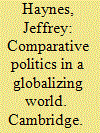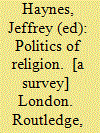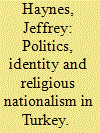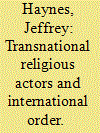|
|
|
Sort Order |
|
|
|
Items / Page
|
|
|
|
|
|
|
| Srl | Item |
| 1 |
ID:
062261


|
|
|
|
|
| Publication |
Cambridge, Polity Press, 2005.
|
| Description |
351p.
|
| Standard Number |
0745630936
|
|
|
|
|
|
|
|
|
|
|
|
Copies: C:1/I:0,R:0,Q:0
Circulation
| Accession# | Call# | Current Location | Status | Policy | Location |
| 049703 | 320.3/HAY 049703 | Main | On Shelf | General | |
|
|
|
|
| 2 |
ID:
062207


|
|
|
|
|
| Publication |
Hampshire, Palgrave Macmillan, 2005.
|
| Description |
357p.
|
| Series |
Palgrave Advances
|
| Standard Number |
1403916357
|
|
|
|
|
|
|
|
|
|
|
|
Copies: C:1/I:0,R:0,Q:0
Circulation
| Accession# | Call# | Current Location | Status | Policy | Location |
| 049661 | 320.97124/HAY 049661 | Main | On Shelf | General | |
|
|
|
|
| 3 |
ID:
073278


|
|
|
|
|
| Publication |
London, Routledge, 2006.
|
| Description |
xi, 283p.
|
| Standard Number |
1857433483
|
|
|
|
|
|
|
|
|
|
|
|
Copies: C:1/I:0,R:1,Q:0
Circulation
| Accession# | Call# | Current Location | Status | Policy | Location |
| 051550 | 322.1/HAY 051550 | Main | On Shelf | Reference books | |
|
|
|
|
| 4 |
ID:
096288


|
|
|
|
|
| Publication |
2010.
|
| Summary/Abstract |
Turkey has had an Islam-influenced government since a general election in 2002. The Justice and Development Party (Adalet ve KalkInma Partisi, abbreviated to AK Parti or AKP) won over a third of the popular vote and took power alone. A subsequent general election in 2007 saw the AKP win again with an improved 47 percent of votes cast. Over the last few years under the AKP, Turkey has often been noted for the 'moderation' of its Islam-influenced government, a positive example of the compatibility of Islam and democracy. The article focuses on Turkey's national identity and the place within it of Islam, secularism and the political role over time of the military, often judged to be the guardian of the country's secular national identity. This involves both a focus on the role and legacy of the country's nationalist founder, Mustafa Kemal Atat rk, and on the special insular and inward-looking self-selected guardian role of the military, long seen as central to national choices of the pursuit of a secular political path. The article argues that one of the defining characteristics of Turkish identity is not Islam or secularism per se. Rather, it is a pronounced, perhaps even xenophobic, fear of outsiders, including not only Westerners but also some Muslim non-Turks. The article suggests that while Islam is part of that sense of identity, it is not at its core. Moreover, if the military has its way, which at the moment seems likely, then Islam will never be allowed to be central to Turkey's sense of national identity.
|
|
|
|
|
|
|
|
|
|
|
|
|
|
|
|
| 5 |
ID:
080361


|
|
|
|
|
| Publication |
Hampshire, Palgrave Macmillan, 2007.
|
| Description |
vii, 250p.
|
| Standard Number |
9780230542464
|
|
|
|
|
|
|
|
|
|
|
|
Copies: C:1/I:0,R:0,Q:0
Circulation
| Accession# | Call# | Current Location | Status | Policy | Location |
| 053108 | 201.73/HAY 053108 | Main | On Shelf | General | |
|
|
|
|
| 6 |
ID:
081218


|
|
|
|
|
| Publication |
2008.
|
| Summary/Abstract |
This article is concerned with religious soft power in foreign policy making through a focus on the foreign policies of the USA, India and Iran. It suggests that, if religious actors 'get the ear' of key foreign policy makers because of their shared religious beliefs, the former may become able to influence foreign policy outcomes through the exercise of religious soft power. In relation to the above-mentioned countries, the article proposes that several named religious actors do significantly influence foreign policy through such a strategy. It also notes that such influence is apparent not only when key policy makers share religious values, norms and beliefs but also when policy makers accept that foreign policy should be informed by them
|
|
|
|
|
|
|
|
|
|
|
|
|
|
|
|
| 7 |
ID:
079665


|
|
|
|
|
| Publication |
2007.
|
| Summary/Abstract |
This paper focuses upon two former British colonies - Uganda and Sudan - to illustrate the contention that civil wars in Africa are typically rooted in religio-ethnic competition and conflict. Such conflicts are normally exacerbated by group competition for material resources in circumstances of developmental failures and political instability. To attempt to deal with the problems that cause religious and ethnic conflict leading to civil war, it is necessary for African countries, including Uganda and Sudan, meaningfully to democratise - to the extent that the great majority of citizens feel that they have a stake in their country's political future. The chances of such an outcome are improved when economies show signs of growing over time and when governments manage to disseminate developmental gains relatively equitably
|
|
|
|
|
|
|
|
|
|
|
|
|
|
|
|
| 8 |
ID:
191844


|
|
|
|
|
| Summary/Abstract |
The article examines two decades of Jerry Rawlings’ rule in Ghana. It seeks to explain why Rawlings’ revolutionary populism did not develop in the direction that he envisaged: a new kind of popular democracy. Instead, Rawlings oversaw the reintroduction of Ghana's popularly preferred political system: ‘Western-style’ multi-party democracy, despite his avowed intention of not doing so. To what extent was this outcome surprising or puzzling? The article explains that it was neither surprising nor puzzling as Rawlings’ regime, the PNDC, lacked the capacity to introduce a radical new political system, despite his desire to do so. His aim – to craft a new kind of popular democracy – was not achievable as both internal and external opposition forces were stronger in their desire for multi-party democracy and a neo-liberal economic system.
|
|
|
|
|
|
|
|
|
|
|
|
|
|
|
|
| 9 |
ID:
093956


|
|
|
|
|
|
|
|